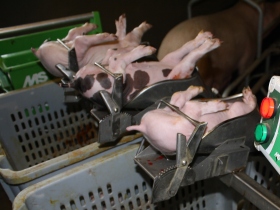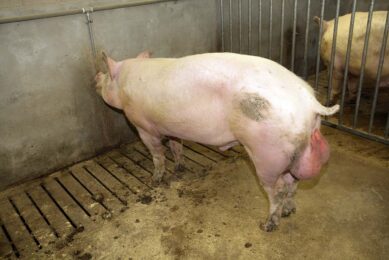Dutch evaluate anaesthetised piglet castration

The Dutch ministry of agriculture (LNV) considers the use of CO2 gas to anaesthetise male piglets before castration an adequate temporary solution until a full ban on castration is reached in 2015.
With regards to technology and methods, practical improvements however can be made. All these evaluations have been made by Dutch agricultural minister Gerda Verburg and sent to©Dutch Parliament.
Piglet castration is considered to be necessary as there is a chance that during cooking pork there may be a chance of boar taint. In the end of 2007, the Dutch retailers, processing industry and pig industry agreed to stop castrating in 2015 and until that date to castrate using anaesthetics. This method now has been evaluated by the Agricultural Economics Research Institute (LEI), part of Wageningen University and Research Centre (WUR).
Castrating using gas anaesthetics
The report evaluates the practice of the castration technique using gas anaesthetics, the way pig producers deal with it and his views on castrating using gas anaesthetics. Recommendations have been included to improve the method, like better technical support and a more active involvement of veterinarians.
The Dutch agri- and horticultural organisation (LTO) and the Dutch union for pig producers (NVV) have responded by creating an action plan around the theme of anaesthetised castration. The minister is said to be happy the pig sector has promptly reacted to the evaluation.
Cooperation
The report shows that all parties involved, industry-wide, agree that cooperation is good in relation to the multistep castration ban. There is happiness related to the inclusion of anaesthetised castration on the way to a total ban – and that financial agreements have been made to pay for the process. Opinions vary as to e.g. compensation of cost price rises for sow breeders.
German research
The minister also had a research carried out as to the 2009 German results indicating that CO2 anaesthetising would only have limited effects on animal welfare. Prof Frauke Ohl (Utrecht University) and Prof Ludo Hellebrekers (chairman, Royal Dutch Veterinary Society) took a close look at this report and concluded that CO2 anaesthetics does not create increased amounts of stress than castration without the use of CO2 anaesthetics.
The minister thus concludes that using gas anaesthetics is better than castration without anaesthetics, provided the practice is carried out properly. She also accepts the recommendation to better agree internationally as to how several methods could contribute to relieving pain and stress during castration.
Related websites:
• Dutch ministry of agriculture, nature and food quality (LNV)
• Royal Dutch Veterinary Society©(in Dutch)
• Wageningen University and Research Centre (WUR)
• Utrecht University
• Agricultural Economics Research Institute (LEI)
• Dutch agri- and horticultural organisation (LTO;©in Dutch)
• Dutch union for pig producers (NVV;©in Dutch)











